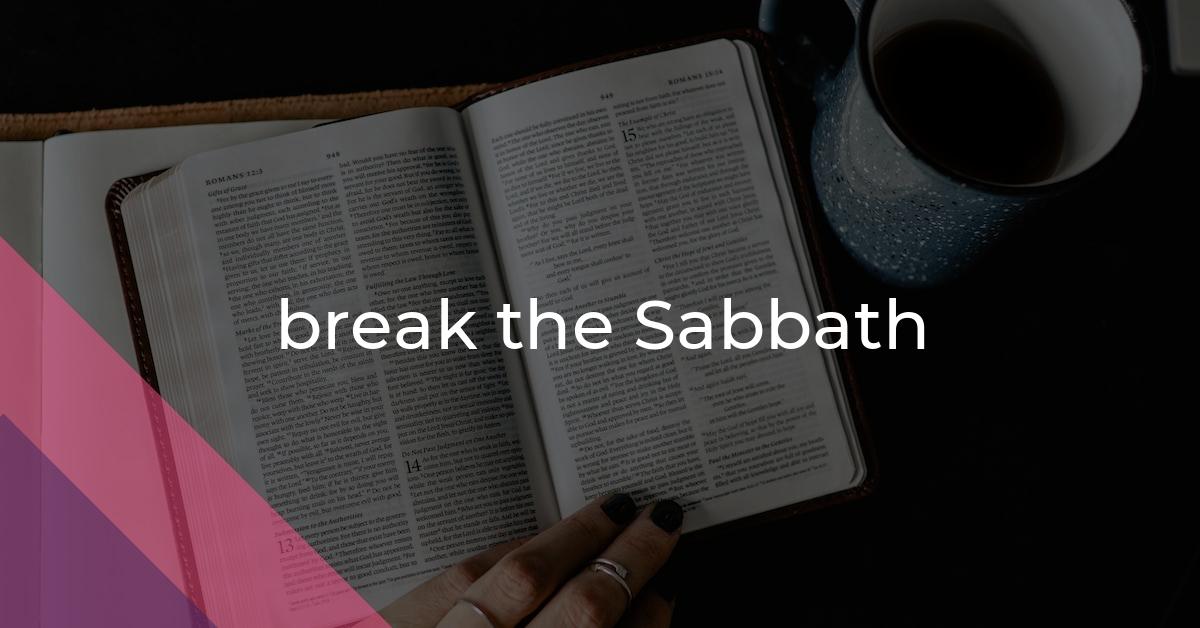break the Sabbath: Idiom Meaning and Origin
What does ‘break the Sabbath’ mean?
The idiom "break the Sabbath" means to violate or ignore religious rules or traditions related to observing the day of rest and worship, typically referring to the Christian Sabbath on Sundays.

Idiom Explorer
An idiom that refers to taking a break or having a period of rest from work or other responsibilities.
The idiom "day out" refers to a day spent doing something enjoyable or different from one's usual routine.
The idiom "day in, day out" means consistently or without interruption, typically referring to a repetitive or monotonous daily routine or task.
The idiom "clean break" means to completely sever ties or end a relationship without any lingering attachments or unresolved issues.
The idiom "call it a day" means to stop working or to cease an activity for the rest of the day.
The idiom "break up" means to end a relationship, usually a romantic one, or to dissolve a group or organization.
The idiom "break the story" means to be the first to uncover or report on important news or information.
The idiom "break the seal" means to be the first person to use a particular facility, usually a restroom, in a group of people. It is believed that breaking the seal will lead to more frequent trips to the restroom.
The idiom *break the Internet* means to cause a sensation or become extremely popular online, often due to a viral post or event that overwhelms the internet with its popularity or impact.
Unmasking the Mystery
The idiom "break the Sabbath" is a commonly used phrase in English language. It signifies intentionally violating the religious observance of the Sabbath, which is traditionally a day of rest and worship. The Sabbath, derived from biblical origin, refers to the seventh day of the week. In Judaism, it is observed from Friday evening to Saturday evening, while in Christianity, it is observed on Sunday. The idiom has its roots in religious traditions and has taken on metaphorical meanings in secular contexts.
The phrase "break the Sabbath" can be traced back to the biblical commandments of the Hebrew Bible, specifically the fourth commandment. This commandment instructs believers to remember and keep the Sabbath holy. In ancient times, violating the Sabbath was considered a serious offense punishable by death. However, in modern usage, the idiom has acquired a figurative connotation and is often used to imply disregarding rules, traditions, or social norms in a broader sense.
In religious context, "break the Sabbath" refers to intentionally violating the laws and ordinances associated with observing the Sabbath day. This includes engaging in forbidden activities such as work, commerce, or any form of labor that is deemed inappropriate on the Sabbath. The prohibition against breaking the Sabbath in the Bible aimed to emphasize the importance of rest, worship, and reflection.
Beyond its religious origins, the idiom has expanded its application to encompass a range of metaphorical meanings. In a secular context, "break the Sabbath" can indicate the act of flouting rules, regulations, or societal norms more generally. This can refer to any form of rebellion, nonconformity, or defiance against established conventions, irrespective of religious observance.
The idiom "break the Sabbath" is not limited to religious contexts. It has permeated into literary works and cultural references, cementing its place in the English language. The religious significance and metaphorical power behind the idiom have made it a compelling phrase for writers and artists to explore themes of rebellion, religious hypocrisy, or societal criticism.
Related Idiom: "break the buck"
The idiom "break the buck" shares similarities with "break the Sabbath" in terms of its metaphorical meaning. While "break the Sabbath" typically implies the breaking of religious or social norms, "break the buck" refers to the act of devaluing or depreciating a currency, particularly the US dollar. Just as "break the Sabbath" signifies disregarding rules, "break the buck" symbolizes undermining the stability and worth of a currency, often through excessive inflation or economic mismanagement.
Although "break the buck" originated from the financial realm, it has also entered popular usage as a metaphor for defying expectations or conventions. In this broader context, "break the buck" implies going against established norms, whether it be in personal relationships, societal expectations, or creative pursuits. The idiom carries a sense of rebellion and nonconformity, similar to the metaphorical usage of "break the Sabbath" in secular contexts.
Related Idiom: "time off"
While "break the Sabbath" relates more directly to religious observance and societal norms, the idiom "time off" shares a similar thematic connection. "Time off" typically refers to a period of rest, relaxation, or leisure when one is not engaged in work or other responsibilities. Just as the Sabbath traditionally signifies a day of rest and worship, "time off" embodies the concept of taking a break and detaching oneself from the demands and pressures of daily life.
Although "time off" can be interpreted more broadly to include vacations, holidays, or any period of leisure, it encapsulates the importance of rest and rejuvenation. Just as observance of the Sabbath is essential for spiritual reflection and replenishment, "time off" allows individuals to recharge their physical and mental well-being.
The idiom "time off" can also be used more figuratively to imply a break or pause in a specific activity or endeavor. This could apply to taking a break from work, school, or any ongoing project or commitment. "Time off" offers a reprieve, allowing individuals to regroup, refocus, and return with a fresh perspective or renewed energy, much like the purpose of Sabbath observance.
Example usage
Examples of how the idiom "break the Sabbath" can be used in a sentence:
- He decided to break the Sabbath and go shopping instead of attending religious services.
- She felt guilty after breaking the Sabbath by watching television all day instead of resting.
- They were criticized by their community for constantly breaking the Sabbath and engaging in secular activities.
More "Religion" idioms



